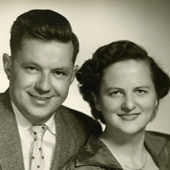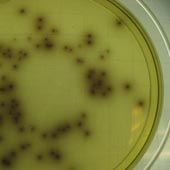
A Little Something Under the Tree for UBC Statisticians

Researchers from the Department of Statistics at UBC are leading a $500,000 Natural Sciences and Engineering Research Council of Canada-funded project to develop improved statistical methodologies for the wood products industry.
In response to market demand for improved product performance and industry's need for more flexibility in the range of products produced, initial studies will focus on monitoring the strength and quality of the lumber supply.
"Lumber is a surprisingly complex material," says Jim Zidek, professor emeritus with the Department of Statistics and co-principle investigator on the project. "The large variability from one piece to another leads to some interesting statistical challenges in determining overall strength and ensuring consistent product quality."
Couple's Legacy Takes Flight at UBC

A passion for birding drew Hildegard and Werner Hesse to UBC for over half a century and created a legacy that will benefit avian research for years to come.
It all started during a summer road trip through British Columbia's Cariboo region in 1956. Across the Cariboo's rolling grasslands and lush valleys, Hildegard and Werner Hesse spotted bird after bird they didn't recognize. When they returned home to Vancouver, the Hesses decided to improve their birding skills by taking a three-year UBC night course on the birds of BC.
The course nurtured their love of birding and eventually drew the couple into avian research at UBC and beyond, helping them cement a large network of like-minded friends across North America. It also led to a lasting relationship between the couple and the university.
The Hesses both passed away in 2008, but generously made arrangements to leave UBC an estate gift that will bolster avian research for years to come. The endowments-which could total as much as $1,150,000-will support avian research in the faculties of Science and Forestry, and provide ongoing summer grants to UBC Science undergraduates conducting ornithological research.
"It's a privilege, and quite humbling, to be able to honour the Hesses' lifelong commitment and passion with these endowments," says UBC dean of Science Simon Peacock. "Their foresight will benefit research and conservation efforts, and enrich the field learning experience for zoology and forest science students for years to come."
The ornithology research endowments follow a long history of support to the university, which included funding for research on Mandarte Island (a bird sanctuary south of Vancouver Island, BC) and for UBC's Beaty Biodiversity Museum.

Killam Teaching Awards
 Did you have a prof whose analysis of programming algorithms or explanation of neutrino oscillation has stuck with you even after graduation? Here's your chance to say thank you. UBC Science is seeking nominations for 2009 Killam Teaching Awards, and all it takes is a letter! Deadline is January 29.
Did you have a prof whose analysis of programming algorithms or explanation of neutrino oscillation has stuck with you even after graduation? Here's your chance to say thank you. UBC Science is seeking nominations for 2009 Killam Teaching Awards, and all it takes is a letter! Deadline is January 29.

Bacteria Vs. Bombs

UBC microbiologist Lindsay Eltis is leading a new $3.45 million Genome BC-funded project which will explore using bacteria to degrade toxic residue left by military munitions.
Nitramines--specifically a compound called RDX--have been used in military munitions for decades, often to propel tank shells. But with increased knowledge of the compounds' environmentally harmful effects, Canadian and US militaries are looking for ways to clean up contaminated test sites.
"RDX is a rich source of nitrogen, and certain bacteria including Rhodococcus and Gordonia, have evolved to thrive on this explosive," says Eltis, a professor with UBC's Department of Microbiology and Immunology.
» Read more about these bacterial clean-up crews

Stocking Stuffers
 Are you searching for the perfect gift for the flora-lover on your list? The UBC Herbarium offers beautifully framed and matted prints, wildflower cards and plant presses. Visit the Herbarium Gift Shop.
Are you searching for the perfect gift for the flora-lover on your list? The UBC Herbarium offers beautifully framed and matted prints, wildflower cards and plant presses. Visit the Herbarium Gift Shop.
 Or get them a UBC Attractions Passport and your flora aficionado can visit the UBC Botanical Garden, Nitobe Memorial Garden and MOA. With additional discounts on books, gifts and places to eat during their visit, this is the perfect gift for the passionate plant-lover! Available at the UBC Bookstore.
Or get them a UBC Attractions Passport and your flora aficionado can visit the UBC Botanical Garden, Nitobe Memorial Garden and MOA. With additional discounts on books, gifts and places to eat during their visit, this is the perfect gift for the passionate plant-lover! Available at the UBC Bookstore.

Microbiologists Map Genome of Key Microbial Indicator of Ocean Health

Researchers at the University of British Columbia and the US Department of Energy Joint Genome Institute have mapped the genome of a microbe that is silently shaping the ecology of the planet's expanding ocean dead zones.
"Microbes specialize in metabolic innovation and many can use alternatives to oxygen, including nitrates, sulfates and metals, breathing these compounds instead of oxygen," says Steve Hallam, an assistant professor of Microbiology and Immunology. "These adaptations likely enable them to thrive in dead zones where their combined metabolic activity influences nutrient and greenhouse gas cycling on a global scale."

'Tis the Season...
 ...to nominate an outstanding alumnus, student or friend for an Alumni Achievement Award. If you know a noteworthy grad whose story needs to be told and applauded, fill out this online nomination. Deadline for nominations is January 31, 2010.
...to nominate an outstanding alumnus, student or friend for an Alumni Achievement Award. If you know a noteworthy grad whose story needs to be told and applauded, fill out this online nomination. Deadline for nominations is January 31, 2010.

Gatekeeper Cells Play Defence Against Listeria

UBC microbiologists have identified a key defence mechanism used by the immune system against Listeria, a finding with important implications for the development of vaccines.
Listeria is the bacteria that causes listeriosis, the food-borne infection that caused 22 deaths in Canada in an August 2008 outbreak in meat products produced by Maple Leaf Foods.
"Dendritic cells are gatekeepers--they are small in numbers but very active in patrolling tissues that are in contact with the external environment, such as the skin," says Wilfred Jefferies, a professor at UBC's Michael Smith Laboratories and Department of Microbiology and Immunology.
"Their job is to apprehend the pathogens while avoiding getting infected. We've found that they achieve this by sampling bits and pieces of the bacterial pathogens in the area surrounding infected cells, instead of directly approaching the bacteria."

Jumping Spiders!
 Listen to Professor Wayne Maddison on ProfTalk as he shares stories from his extensive field research in Papua New Guinea, Africa and the Dominican Republic. Maddison has discovered several new species of spider and has observed the mating behaviour that has earned these arthropods the moniker "Jumping Spiders."
Listen to Professor Wayne Maddison on ProfTalk as he shares stories from his extensive field research in Papua New Guinea, Africa and the Dominican Republic. Maddison has discovered several new species of spider and has observed the mating behaviour that has earned these arthropods the moniker "Jumping Spiders."

Science Alumnus Follows in Darwin's Footsteps

Renowned evolutionary biologist Peter Grant, who received his PhD in Zoology from UBC in 1964, and his wife Rosemary have won the 2009 Kyoto Prize in the Basic Sciences.
The Grants, both currently professors emeriti at Princeton University, earned the prize for their work documenting rapid evolution caused by natural selection in response to environmental changes. The couple is the first husband and wife team to receive the award, which was presented to them this November.
The Grants met in 1960 at UBC, where Rosemary was a research associate. They have spent decades studying 14 species of Galápagos Island finches-including seminal research demonstrating how the beak size of ground finches evolves as a consequence of the availability of different-sized seeds, which fluctuates with rainfall. Their scientific output includes more than 200 papers, and the couple has shared numerous honours including the Darwin Medal (Royal Society, UK) and the Edward O. Wilson Naturalist Award (American Soceity of Naturalists).
» Read more about the Grants in Synergy 2 | 2009

The Open Source Outbreak
 Watch UBC Science alumna Jennifer Gardy's TEDx Terry Talk on how open source access to information played a defining role in the H1N1 outbreak. Gardy is a researcher with the BC Centre for Disease Control and blogs as Nerd Girl for The Globe and Mail.
Watch UBC Science alumna Jennifer Gardy's TEDx Terry Talk on how open source access to information played a defining role in the H1N1 outbreak. Gardy is a researcher with the BC Centre for Disease Control and blogs as Nerd Girl for The Globe and Mail.

Featured Alumni
Dana Hosseini (1987, BSc)

Current employer: DiThera Inc.
Current position: Co-Founder/President
Best UBC memory: Grabbing a UBC cinnamon bun and coffee before heading to an early morning lecture.
Favourite professor or course: I had many terrific professors, but the professor and course that stands out and stills drives my scientific curiosity was a 400 level developmental biology course taught by Hugh Brock. This small, intense class revealed that the roles of genes in development are not straightforward and they are not going to give up their secrets easily. Over 20 years later that assertion still holds true.
Importance of science background: The saying goes that you should pursue the things in life that you love because you will do them well. A passion for genetics and knack for business has allowed me to pursue careers in large pharmaceutical companies and small biotech firms and now has allowed me to found my own biotech company.
Most memorable experience after graduating: My marriage, the birth of my two daughters.
Overall UBC Science experience: UBC Science stoked my curiosity and gave me a terrific foundation on which I built my career.
Class Connections
1960s
After graduating, Andy Pickard (BSC '64 Chem) left his home on the West Coast for the University of Western Ontario, where he received his PhD in 1967. He then went to the University of Chicago to work on his post-doctorate in reaction kinetics. Pickard left the Windy City and moved to Sarnia, where he spent 10 years with Imperial Oil helping to 'save the whales' by developing new lubricant additives that replaced the use of sperm whale oil in industrial gear oils. He also worked on testing the paraffin wax used to coat paper drinking cups (that's in the really old days before disposable plastic cups). In mid-winter 1979, Pickard joined Petro-Canada and moved with his family to Calgary. He spent the next 24 years applying chemistry to oil sands, heavy oils, and eventually to the whole range of fossil fuels. Pickard retired in 2003, then began doing fuel consulting in Rio de Janeiro. He is now back on the West Coast, and lives in Qualicum Beach with his wife Charlene.
1980s
Following graduation Nancy Cocking (BSC '87 Biology) spent eight months at Capilano College studying the legal secretarial course. She was hired by Bull, Housser & Tupper's securities department, becoming a securities paralegal less than a year later. In 1990, Cocking joined Borden Ladner Gervais as a corporate finance paralegal and has been at BLG ever since. In her free time, Cocking volunteers as a member of the Burnaby Power & Sail Squadron, and became a life member two years ago after 20 years of service. She also indulges her love of travel whenever possible, and has spent time in the UK, Italy, France, Switzerland and Austria, Malta and Australia, as well as various locales closer to home in Washington State and BC. Cocking is engaged to be married, and plans to sail happily into the sunset in September 2010.
Grant Brown (BSc '87, Biochem) has lived in Toronto for the last 10 years with his wife Tori (BA, 1987) and their three children, Keara, Maisie, and Declan. An associate professor of biochemistry at the University of Toronto, Brown has an active basic cancer research lab in the Donnelly Centre for Cellular and Biomolecular Research. In his spare time he enjoys running, cycling, and swimming and travelling with his family, most recently in Girona, Spain.
Recent travels? A new family addition? A promotion or career transition? Whatever it is, we'd love to hear from you. Connect by sending a brief note to: science.connect@ubc.ca. We'll make every effort to include it in our next issue.
Events

Festive Bach Cantatas for Christmas
Don't miss this popular Christmas tradition, with a programme that features some of J. S. Bach's grandest cantatas, including the third cantata from his beloved Christmas Oratorio.
» December 23, 2009
Understanding Enzymes
Canada Research Chair Steve Withers on inhibiting enzymes: the move towards new drugs for influenza and diabetes.
» January 12, 2010
Studying Serpentinites
University of Washington's Bernard Evans explains how these state rocks of California are formed--and what they can tell us.
» January 14, 2010
Bioelectronics
Rahul Sarpeshkar, MIT, with a look at the first great analog and digital circuit designer--nature.
» January 21, 2010
GET IN ON THE OLYMPICS ACTION!

Science grads, here's your chance to win tickets to a Women's Olympic Hockey or Paralympic Sledge Hockey game held at UBC. Enter online and you could find yourself cheering on world class athletes this winter!
» Contest closes January 22, 2010
HAPPY HOLIDAYS
The Faculty of Science wishes all of our zoologists, geologists, botanists, chemists, pharmacologists, marine biologists, immunologists, microbiologists, actuaries, professors, researchers, oceanographers, mathematicians, programmers, physicists, faculty and staff--our Science alumni--a very happy and healthy holiday season.
KUDOS
UBC to Host National New Media and Animation Research Network
A new $23.2 million Network of Centres of Excellence designed to advance Canada's position as a global leader in new media, animation and games is to be hosted by the University of British Columbia.
The Graphics, Animation and New Media network will be headquartered at the Centre for Digital Media at Great Northern Way Campus.
UBC Mathematician Wins Rising Star Prize
Assistant Professor Omer Angel has been awarded the 2010 André-Aisenstadt Prize, which recognizes outstanding achievement by a young Canadian mathematician in pure or applied mathematics. Angel was cited for his research in probability theory, on percolation, random walks and random spatial processes.
UBC Computer Science Students Reclaim Title at International Programming Competition
CS students have won the 2009 ACM International Collegiate Programming Contest Pacific Northwest Regionals, beating out teams from Stanford and Berkeley for a chance to compete at the world finals this February.
Unruh Appointed Perimeter Institute Distinguished Research Chair
UBC Physics Professor William Unruh joins Stephen Hawking and other eminent physicists as a Distinguished Research Chair at the Perimeter Institute. The citation points to Unruh's seminal contributions to the understanding of gravity, black holes and the foundations of quantum mechanics.
UBC Scientists to Help Evaluate Canada's Biodiversity Research Capacity
Two UBC scientists have been appointed to a national panel tasked with reviewing the state of biodiversity research in Canada. Professors Wayne Maddison and Sarah Otto will join 13 other biodiversity experts on a Council of Canadian Academies panel.
UBC SCI FACTS

December, 1939: Christmas Mountains, New Brunswick--Zoology Professor Kris Kringle conducts the first behavioural study of flying reindeer. In his field notes, he records an unusual phenomenon in one reindeer--his nose glows red! Kringle dubs the occurence "The Rudolph Effect."
YOUR PRIVACY
You're receiving Science Connect because, as a UBC Science alumni or supporter, you've given the university permission to contact you. And while we hope you find our e-magazine interesting, we take your privacy seriously, and have made it simple to:
»
»
Copyright 2009, UBC Faculty of Science
Update your email or address | Privacy
